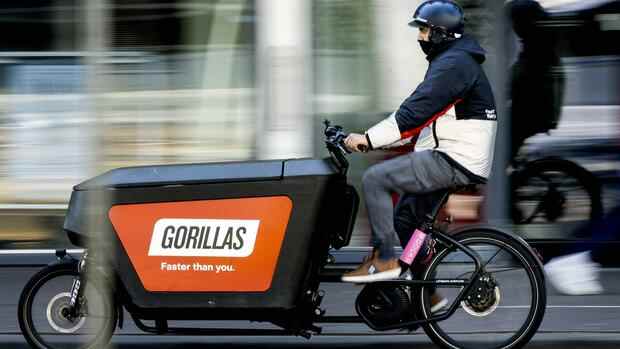Express delivery services are only possible for very short delivery routes.
(Photo: IMAGO/ANP)
It’s a fascinating idea to have groceries delivered within ten minutes of ordering. Just organizing the logistics is an impressive achievement. This is what usually distinguishes founders from established companies: They try to make possible what others consider impossible.
But more and more start-ups are now realizing that realizing an exciting idea or solving a technical problem is by no means a business model.
Gorillas, Flink, Zapp and their ilk make a cardinal mistake that many founders make: They offer something because they can instead of asking about the real needs of consumers.
Very few people in very specific situations need truly fresh food within ten minutes. And many of them can then visit a shop around the corner for it. However, anyone who only takes a 10-minute delivery service with them because it is currently being offered is usually not willing to pay a reasonable, i.e. cost-covering, price for this special service. But that is exactly the imperative basis for a functioning business model.
Top jobs of the day
Find the best jobs now and
be notified by email.
In addition, express delivery services are only possible for very short delivery routes. This business needs a high customer density, which is only available in large cities. A dense network of distribution centers and a large number of drivers who are constantly available are also necessary. However, this makes them a niche service with a relatively expensive infrastructure.
Founders have to think from the customer’s point of view
Rapid scaling, which is a prerequisite for the path to profitability, is therefore difficult to achieve. The fact that Gorillas has just closed the locations in many medium-sized cities in North Rhine-Westphalia is precisely proof of this.
The Amazon model for success shows how important customer-centric thinking is when setting up new businesses. With every new service, the company asks itself what it will bring to the customer. The Prime subscription service, for example, with its free, fast deliveries and the additional media offering, has become so indispensable for many consumers that they will accept the recent significant price increase without canceling.
There is also a market for quick deliveries of groceries. But it’s probably so small that it feeds a few specialist companies in selected cities. He does not justify valuations in the billions for ambitious growth companies.
More: The end of the delivery hype – the internal ratings of some delivery services collapse
